Impact of Global Financial Crises and Brexit on Markets
VerifiedAdded on 2023/01/09
|11
|3646
|31
Report
AI Summary
This report provides an in-depth analysis of several key topics in international finance. It begins by examining the causes of the 2008-2009 global financial crises, highlighting factors such as the housing market bubble, reckless lending practices, and deregulation within the financial industry. The report then explores the role of financial regulations in maintaining market stability, emphasizing their importance in preventing market failures, protecting investors, and promoting macroeconomic stability. Furthermore, it delves into the impact of Basel III regulations on enhancing the safety of banks by setting guidelines for leverage ratios, liquidity, and capital requirements. The report also evaluates the effects of Brexit on the UK stock market and the pound sterling, identifying factors such as economic slowdown, reduced investor confidence, and trade implications. Finally, the report discusses the determinants of short-term and long-term interest rates and their role in the economy, including the influence of inflation, interest rate policies, and market speculation.
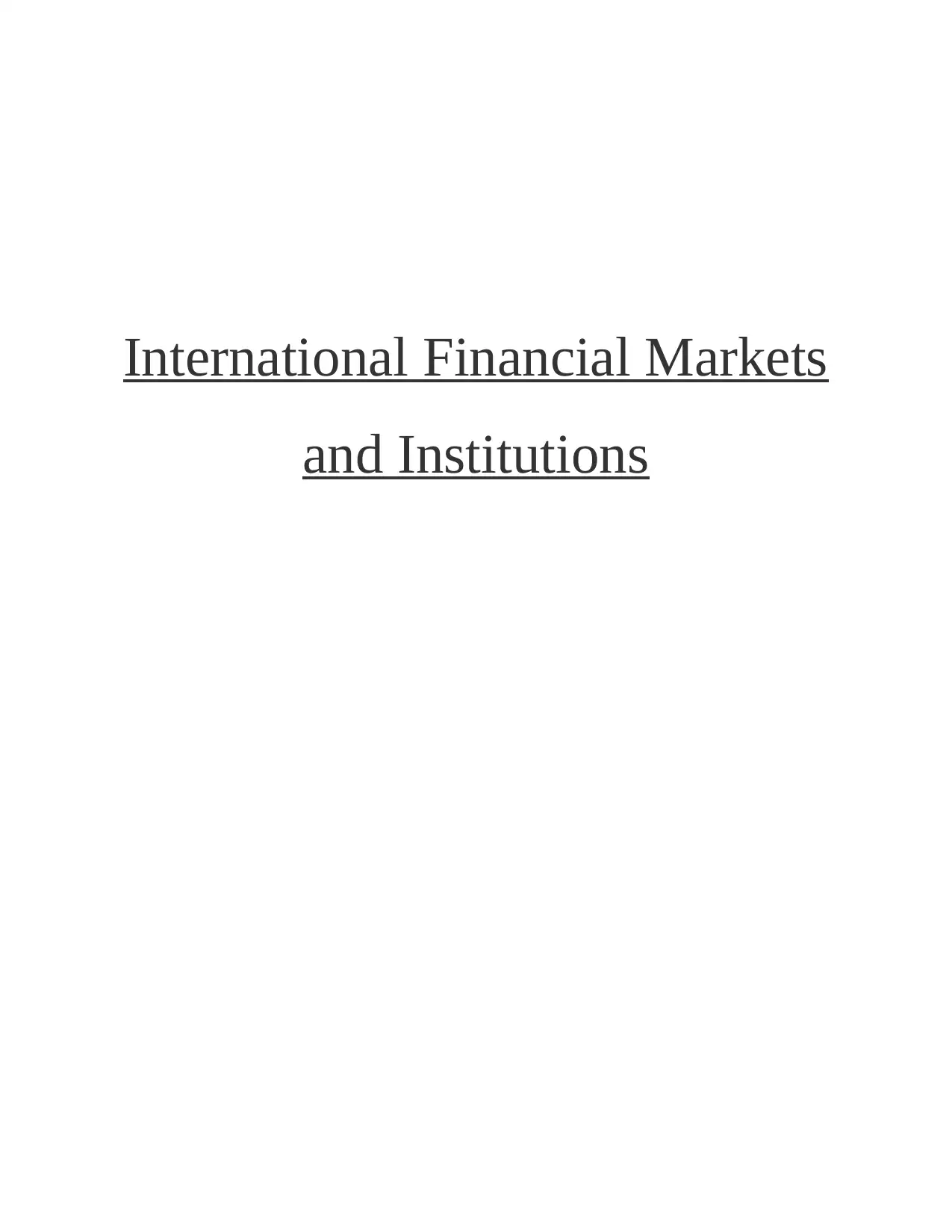
International Financial Markets
and Institutions
and Institutions
Paraphrase This Document
Need a fresh take? Get an instant paraphrase of this document with our AI Paraphraser
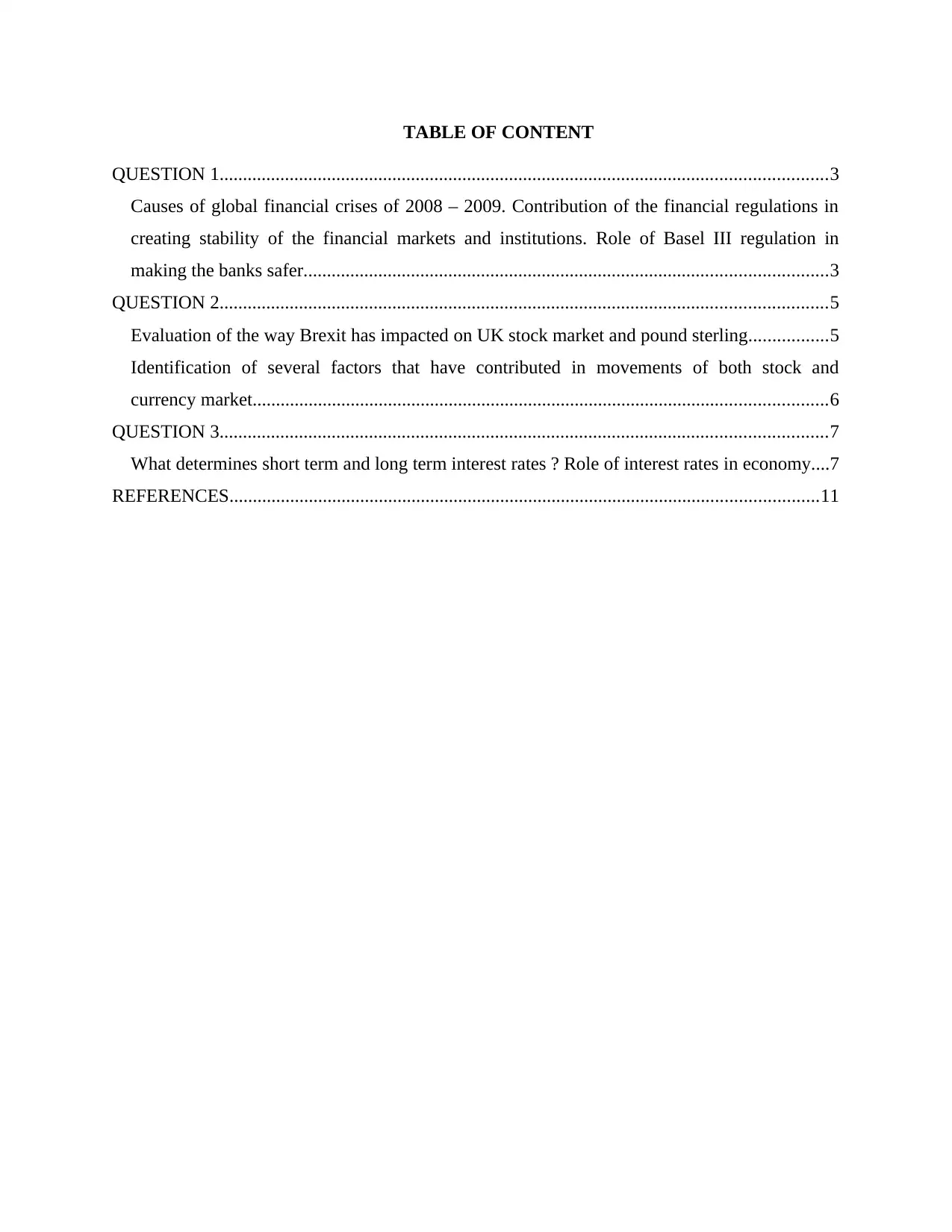
TABLE OF CONTENT
QUESTION 1..................................................................................................................................3
Causes of global financial crises of 2008 – 2009. Contribution of the financial regulations in
creating stability of the financial markets and institutions. Role of Basel III regulation in
making the banks safer................................................................................................................3
QUESTION 2..................................................................................................................................5
Evaluation of the way Brexit has impacted on UK stock market and pound sterling.................5
Identification of several factors that have contributed in movements of both stock and
currency market...........................................................................................................................6
QUESTION 3..................................................................................................................................7
What determines short term and long term interest rates ? Role of interest rates in economy....7
REFERENCES..............................................................................................................................11
QUESTION 1..................................................................................................................................3
Causes of global financial crises of 2008 – 2009. Contribution of the financial regulations in
creating stability of the financial markets and institutions. Role of Basel III regulation in
making the banks safer................................................................................................................3
QUESTION 2..................................................................................................................................5
Evaluation of the way Brexit has impacted on UK stock market and pound sterling.................5
Identification of several factors that have contributed in movements of both stock and
currency market...........................................................................................................................6
QUESTION 3..................................................................................................................................7
What determines short term and long term interest rates ? Role of interest rates in economy....7
REFERENCES..............................................................................................................................11
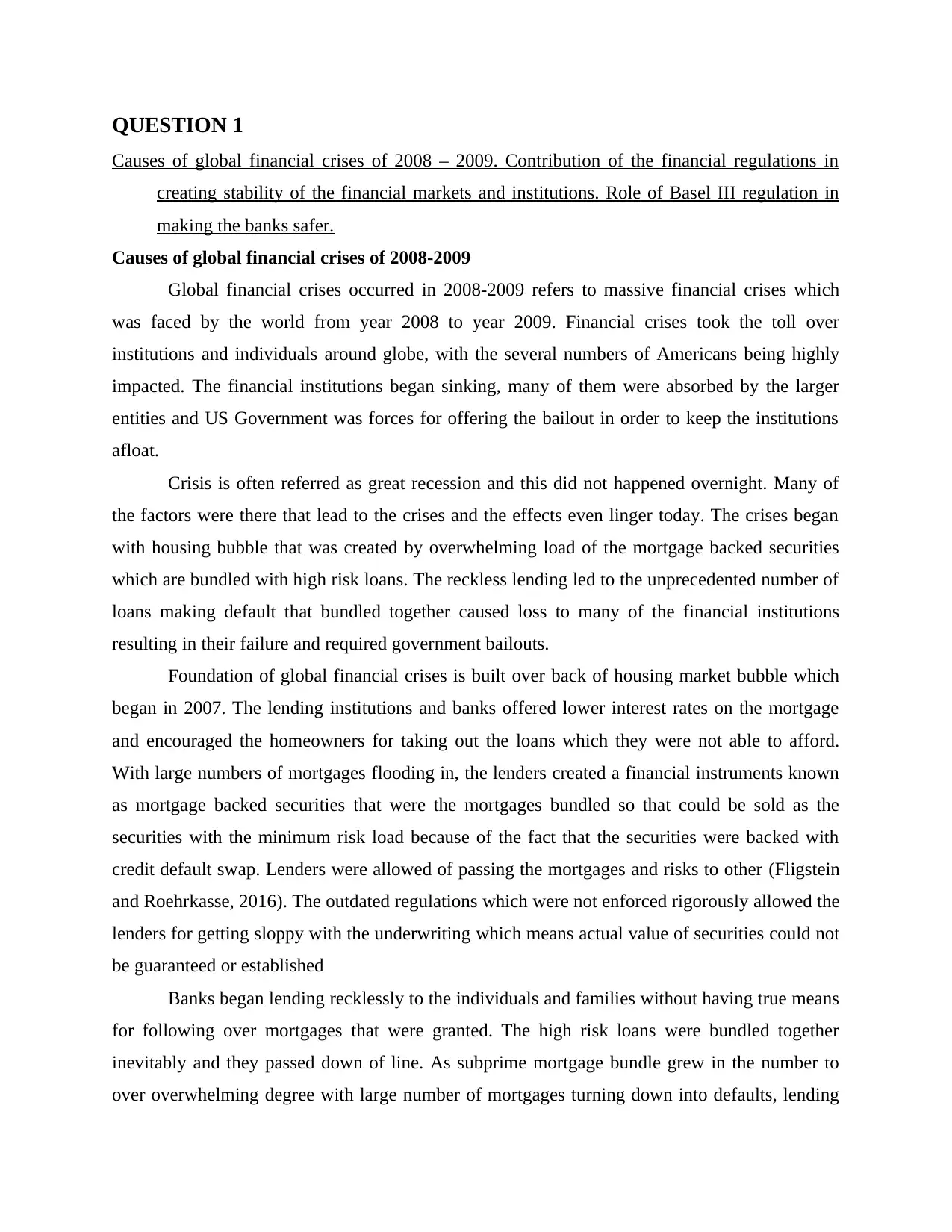
QUESTION 1
Causes of global financial crises of 2008 – 2009. Contribution of the financial regulations in
creating stability of the financial markets and institutions. Role of Basel III regulation in
making the banks safer.
Causes of global financial crises of 2008-2009
Global financial crises occurred in 2008-2009 refers to massive financial crises which
was faced by the world from year 2008 to year 2009. Financial crises took the toll over
institutions and individuals around globe, with the several numbers of Americans being highly
impacted. The financial institutions began sinking, many of them were absorbed by the larger
entities and US Government was forces for offering the bailout in order to keep the institutions
afloat.
Crisis is often referred as great recession and this did not happened overnight. Many of
the factors were there that lead to the crises and the effects even linger today. The crises began
with housing bubble that was created by overwhelming load of the mortgage backed securities
which are bundled with high risk loans. The reckless lending led to the unprecedented number of
loans making default that bundled together caused loss to many of the financial institutions
resulting in their failure and required government bailouts.
Foundation of global financial crises is built over back of housing market bubble which
began in 2007. The lending institutions and banks offered lower interest rates on the mortgage
and encouraged the homeowners for taking out the loans which they were not able to afford.
With large numbers of mortgages flooding in, the lenders created a financial instruments known
as mortgage backed securities that were the mortgages bundled so that could be sold as the
securities with the minimum risk load because of the fact that the securities were backed with
credit default swap. Lenders were allowed of passing the mortgages and risks to other (Fligstein
and Roehrkasse, 2016). The outdated regulations which were not enforced rigorously allowed the
lenders for getting sloppy with the underwriting which means actual value of securities could not
be guaranteed or established
Banks began lending recklessly to the individuals and families without having true means
for following over mortgages that were granted. The high risk loans were bundled together
inevitably and they passed down of line. As subprime mortgage bundle grew in the number to
over overwhelming degree with large number of mortgages turning down into defaults, lending
Causes of global financial crises of 2008 – 2009. Contribution of the financial regulations in
creating stability of the financial markets and institutions. Role of Basel III regulation in
making the banks safer.
Causes of global financial crises of 2008-2009
Global financial crises occurred in 2008-2009 refers to massive financial crises which
was faced by the world from year 2008 to year 2009. Financial crises took the toll over
institutions and individuals around globe, with the several numbers of Americans being highly
impacted. The financial institutions began sinking, many of them were absorbed by the larger
entities and US Government was forces for offering the bailout in order to keep the institutions
afloat.
Crisis is often referred as great recession and this did not happened overnight. Many of
the factors were there that lead to the crises and the effects even linger today. The crises began
with housing bubble that was created by overwhelming load of the mortgage backed securities
which are bundled with high risk loans. The reckless lending led to the unprecedented number of
loans making default that bundled together caused loss to many of the financial institutions
resulting in their failure and required government bailouts.
Foundation of global financial crises is built over back of housing market bubble which
began in 2007. The lending institutions and banks offered lower interest rates on the mortgage
and encouraged the homeowners for taking out the loans which they were not able to afford.
With large numbers of mortgages flooding in, the lenders created a financial instruments known
as mortgage backed securities that were the mortgages bundled so that could be sold as the
securities with the minimum risk load because of the fact that the securities were backed with
credit default swap. Lenders were allowed of passing the mortgages and risks to other (Fligstein
and Roehrkasse, 2016). The outdated regulations which were not enforced rigorously allowed the
lenders for getting sloppy with the underwriting which means actual value of securities could not
be guaranteed or established
Banks began lending recklessly to the individuals and families without having true means
for following over mortgages that were granted. The high risk loans were bundled together
inevitably and they passed down of line. As subprime mortgage bundle grew in the number to
over overwhelming degree with large number of mortgages turning down into defaults, lending
⊘ This is a preview!⊘
Do you want full access?
Subscribe today to unlock all pages.

Trusted by 1+ million students worldwide
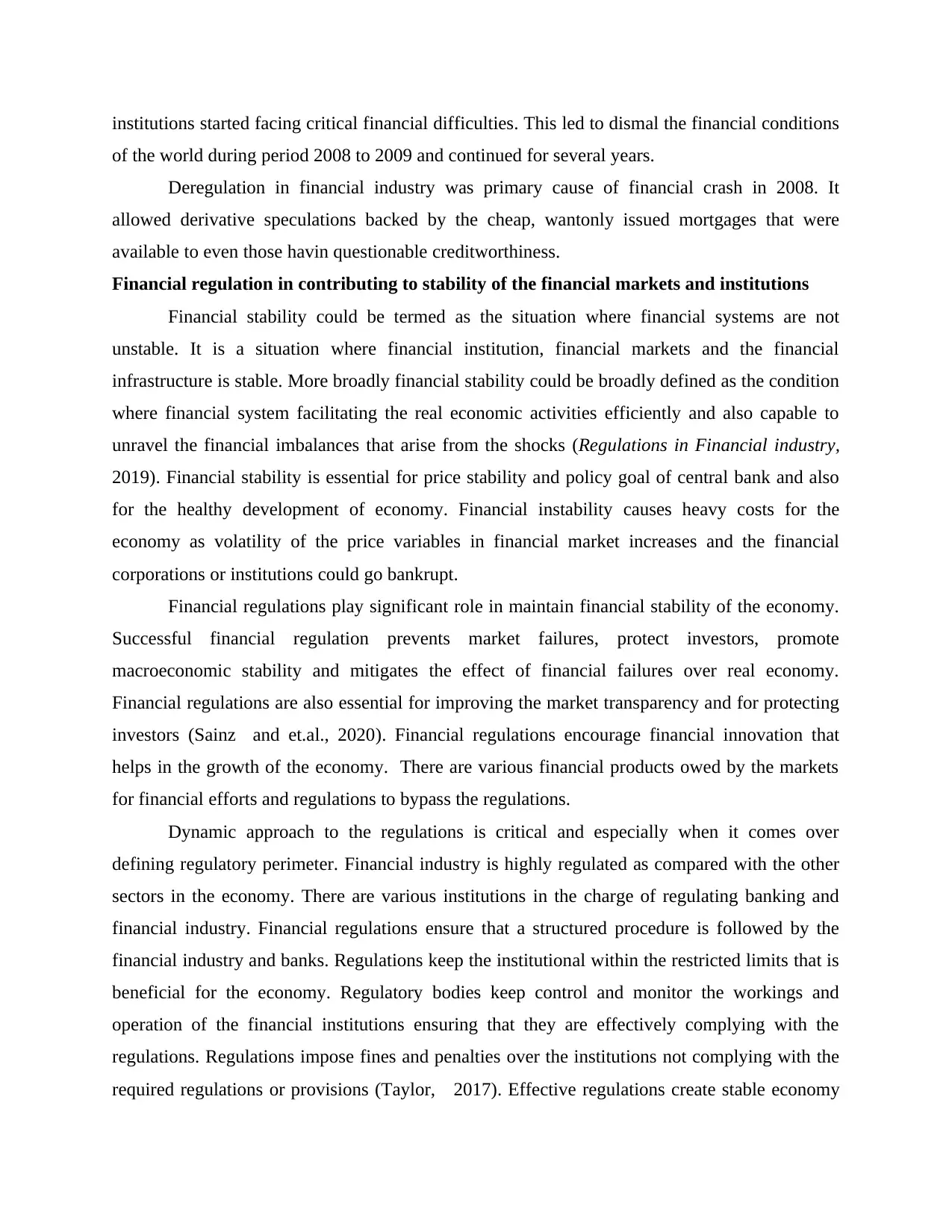
institutions started facing critical financial difficulties. This led to dismal the financial conditions
of the world during period 2008 to 2009 and continued for several years.
Deregulation in financial industry was primary cause of financial crash in 2008. It
allowed derivative speculations backed by the cheap, wantonly issued mortgages that were
available to even those havin questionable creditworthiness.
Financial regulation in contributing to stability of the financial markets and institutions
Financial stability could be termed as the situation where financial systems are not
unstable. It is a situation where financial institution, financial markets and the financial
infrastructure is stable. More broadly financial stability could be broadly defined as the condition
where financial system facilitating the real economic activities efficiently and also capable to
unravel the financial imbalances that arise from the shocks (Regulations in Financial industry,
2019). Financial stability is essential for price stability and policy goal of central bank and also
for the healthy development of economy. Financial instability causes heavy costs for the
economy as volatility of the price variables in financial market increases and the financial
corporations or institutions could go bankrupt.
Financial regulations play significant role in maintain financial stability of the economy.
Successful financial regulation prevents market failures, protect investors, promote
macroeconomic stability and mitigates the effect of financial failures over real economy.
Financial regulations are also essential for improving the market transparency and for protecting
investors (Sainz and et.al., 2020). Financial regulations encourage financial innovation that
helps in the growth of the economy. There are various financial products owed by the markets
for financial efforts and regulations to bypass the regulations.
Dynamic approach to the regulations is critical and especially when it comes over
defining regulatory perimeter. Financial industry is highly regulated as compared with the other
sectors in the economy. There are various institutions in the charge of regulating banking and
financial industry. Financial regulations ensure that a structured procedure is followed by the
financial industry and banks. Regulations keep the institutional within the restricted limits that is
beneficial for the economy. Regulatory bodies keep control and monitor the workings and
operation of the financial institutions ensuring that they are effectively complying with the
regulations. Regulations impose fines and penalties over the institutions not complying with the
required regulations or provisions (Taylor, 2017). Effective regulations create stable economy
of the world during period 2008 to 2009 and continued for several years.
Deregulation in financial industry was primary cause of financial crash in 2008. It
allowed derivative speculations backed by the cheap, wantonly issued mortgages that were
available to even those havin questionable creditworthiness.
Financial regulation in contributing to stability of the financial markets and institutions
Financial stability could be termed as the situation where financial systems are not
unstable. It is a situation where financial institution, financial markets and the financial
infrastructure is stable. More broadly financial stability could be broadly defined as the condition
where financial system facilitating the real economic activities efficiently and also capable to
unravel the financial imbalances that arise from the shocks (Regulations in Financial industry,
2019). Financial stability is essential for price stability and policy goal of central bank and also
for the healthy development of economy. Financial instability causes heavy costs for the
economy as volatility of the price variables in financial market increases and the financial
corporations or institutions could go bankrupt.
Financial regulations play significant role in maintain financial stability of the economy.
Successful financial regulation prevents market failures, protect investors, promote
macroeconomic stability and mitigates the effect of financial failures over real economy.
Financial regulations are also essential for improving the market transparency and for protecting
investors (Sainz and et.al., 2020). Financial regulations encourage financial innovation that
helps in the growth of the economy. There are various financial products owed by the markets
for financial efforts and regulations to bypass the regulations.
Dynamic approach to the regulations is critical and especially when it comes over
defining regulatory perimeter. Financial industry is highly regulated as compared with the other
sectors in the economy. There are various institutions in the charge of regulating banking and
financial industry. Financial regulations ensure that a structured procedure is followed by the
financial industry and banks. Regulations keep the institutional within the restricted limits that is
beneficial for the economy. Regulatory bodies keep control and monitor the workings and
operation of the financial institutions ensuring that they are effectively complying with the
regulations. Regulations impose fines and penalties over the institutions not complying with the
required regulations or provisions (Taylor, 2017). Effective regulations create stable economy
Paraphrase This Document
Need a fresh take? Get an instant paraphrase of this document with our AI Paraphraser
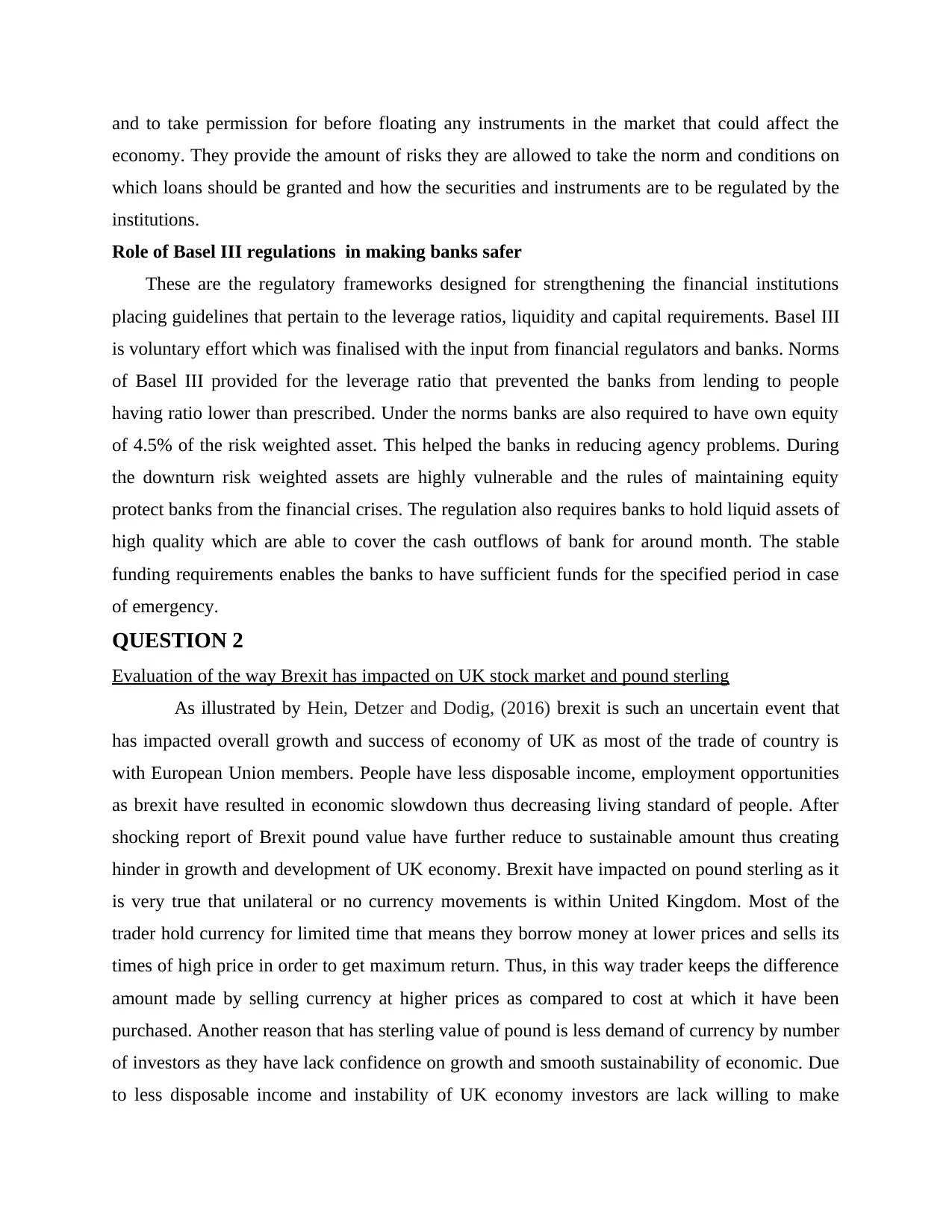
and to take permission for before floating any instruments in the market that could affect the
economy. They provide the amount of risks they are allowed to take the norm and conditions on
which loans should be granted and how the securities and instruments are to be regulated by the
institutions.
Role of Basel III regulations in making banks safer
These are the regulatory frameworks designed for strengthening the financial institutions
placing guidelines that pertain to the leverage ratios, liquidity and capital requirements. Basel III
is voluntary effort which was finalised with the input from financial regulators and banks. Norms
of Basel III provided for the leverage ratio that prevented the banks from lending to people
having ratio lower than prescribed. Under the norms banks are also required to have own equity
of 4.5% of the risk weighted asset. This helped the banks in reducing agency problems. During
the downturn risk weighted assets are highly vulnerable and the rules of maintaining equity
protect banks from the financial crises. The regulation also requires banks to hold liquid assets of
high quality which are able to cover the cash outflows of bank for around month. The stable
funding requirements enables the banks to have sufficient funds for the specified period in case
of emergency.
QUESTION 2
Evaluation of the way Brexit has impacted on UK stock market and pound sterling
As illustrated by Hein, Detzer and Dodig, (2016) brexit is such an uncertain event that
has impacted overall growth and success of economy of UK as most of the trade of country is
with European Union members. People have less disposable income, employment opportunities
as brexit have resulted in economic slowdown thus decreasing living standard of people. After
shocking report of Brexit pound value have further reduce to sustainable amount thus creating
hinder in growth and development of UK economy. Brexit have impacted on pound sterling as it
is very true that unilateral or no currency movements is within United Kingdom. Most of the
trader hold currency for limited time that means they borrow money at lower prices and sells its
times of high price in order to get maximum return. Thus, in this way trader keeps the difference
amount made by selling currency at higher prices as compared to cost at which it have been
purchased. Another reason that has sterling value of pound is less demand of currency by number
of investors as they have lack confidence on growth and smooth sustainability of economic. Due
to less disposable income and instability of UK economy investors are lack willing to make
economy. They provide the amount of risks they are allowed to take the norm and conditions on
which loans should be granted and how the securities and instruments are to be regulated by the
institutions.
Role of Basel III regulations in making banks safer
These are the regulatory frameworks designed for strengthening the financial institutions
placing guidelines that pertain to the leverage ratios, liquidity and capital requirements. Basel III
is voluntary effort which was finalised with the input from financial regulators and banks. Norms
of Basel III provided for the leverage ratio that prevented the banks from lending to people
having ratio lower than prescribed. Under the norms banks are also required to have own equity
of 4.5% of the risk weighted asset. This helped the banks in reducing agency problems. During
the downturn risk weighted assets are highly vulnerable and the rules of maintaining equity
protect banks from the financial crises. The regulation also requires banks to hold liquid assets of
high quality which are able to cover the cash outflows of bank for around month. The stable
funding requirements enables the banks to have sufficient funds for the specified period in case
of emergency.
QUESTION 2
Evaluation of the way Brexit has impacted on UK stock market and pound sterling
As illustrated by Hein, Detzer and Dodig, (2016) brexit is such an uncertain event that
has impacted overall growth and success of economy of UK as most of the trade of country is
with European Union members. People have less disposable income, employment opportunities
as brexit have resulted in economic slowdown thus decreasing living standard of people. After
shocking report of Brexit pound value have further reduce to sustainable amount thus creating
hinder in growth and development of UK economy. Brexit have impacted on pound sterling as it
is very true that unilateral or no currency movements is within United Kingdom. Most of the
trader hold currency for limited time that means they borrow money at lower prices and sells its
times of high price in order to get maximum return. Thus, in this way trader keeps the difference
amount made by selling currency at higher prices as compared to cost at which it have been
purchased. Another reason that has sterling value of pound is less demand of currency by number
of investors as they have lack confidence on growth and smooth sustainability of economic. Due
to less disposable income and instability of UK economy investors are lack willing to make
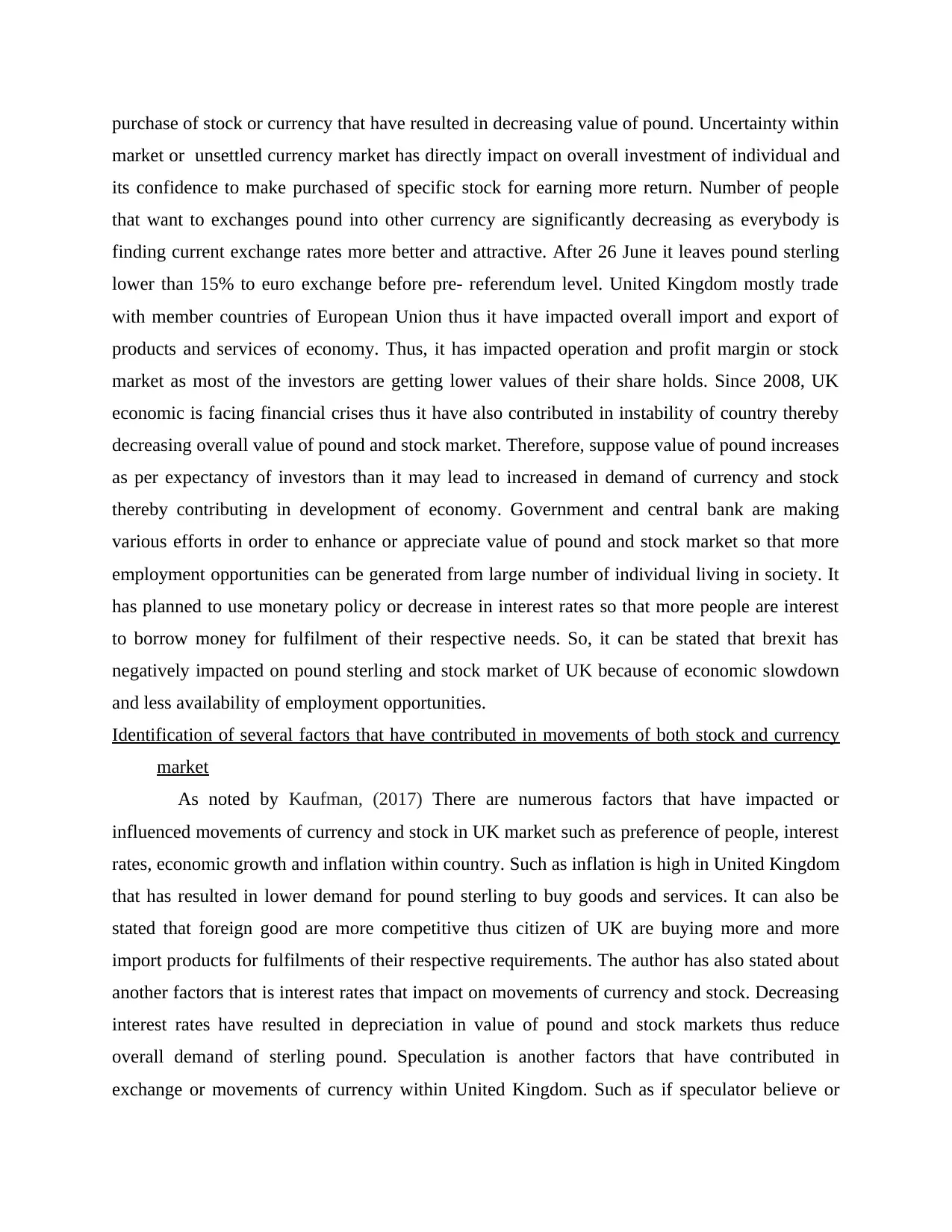
purchase of stock or currency that have resulted in decreasing value of pound. Uncertainty within
market or unsettled currency market has directly impact on overall investment of individual and
its confidence to make purchased of specific stock for earning more return. Number of people
that want to exchanges pound into other currency are significantly decreasing as everybody is
finding current exchange rates more better and attractive. After 26 June it leaves pound sterling
lower than 15% to euro exchange before pre- referendum level. United Kingdom mostly trade
with member countries of European Union thus it have impacted overall import and export of
products and services of economy. Thus, it has impacted operation and profit margin or stock
market as most of the investors are getting lower values of their share holds. Since 2008, UK
economic is facing financial crises thus it have also contributed in instability of country thereby
decreasing overall value of pound and stock market. Therefore, suppose value of pound increases
as per expectancy of investors than it may lead to increased in demand of currency and stock
thereby contributing in development of economy. Government and central bank are making
various efforts in order to enhance or appreciate value of pound and stock market so that more
employment opportunities can be generated from large number of individual living in society. It
has planned to use monetary policy or decrease in interest rates so that more people are interest
to borrow money for fulfilment of their respective needs. So, it can be stated that brexit has
negatively impacted on pound sterling and stock market of UK because of economic slowdown
and less availability of employment opportunities.
Identification of several factors that have contributed in movements of both stock and currency
market
As noted by Kaufman, (2017) There are numerous factors that have impacted or
influenced movements of currency and stock in UK market such as preference of people, interest
rates, economic growth and inflation within country. Such as inflation is high in United Kingdom
that has resulted in lower demand for pound sterling to buy goods and services. It can also be
stated that foreign good are more competitive thus citizen of UK are buying more and more
import products for fulfilments of their respective requirements. The author has also stated about
another factors that is interest rates that impact on movements of currency and stock. Decreasing
interest rates have resulted in depreciation in value of pound and stock markets thus reduce
overall demand of sterling pound. Speculation is another factors that have contributed in
exchange or movements of currency within United Kingdom. Such as if speculator believe or
market or unsettled currency market has directly impact on overall investment of individual and
its confidence to make purchased of specific stock for earning more return. Number of people
that want to exchanges pound into other currency are significantly decreasing as everybody is
finding current exchange rates more better and attractive. After 26 June it leaves pound sterling
lower than 15% to euro exchange before pre- referendum level. United Kingdom mostly trade
with member countries of European Union thus it have impacted overall import and export of
products and services of economy. Thus, it has impacted operation and profit margin or stock
market as most of the investors are getting lower values of their share holds. Since 2008, UK
economic is facing financial crises thus it have also contributed in instability of country thereby
decreasing overall value of pound and stock market. Therefore, suppose value of pound increases
as per expectancy of investors than it may lead to increased in demand of currency and stock
thereby contributing in development of economy. Government and central bank are making
various efforts in order to enhance or appreciate value of pound and stock market so that more
employment opportunities can be generated from large number of individual living in society. It
has planned to use monetary policy or decrease in interest rates so that more people are interest
to borrow money for fulfilment of their respective needs. So, it can be stated that brexit has
negatively impacted on pound sterling and stock market of UK because of economic slowdown
and less availability of employment opportunities.
Identification of several factors that have contributed in movements of both stock and currency
market
As noted by Kaufman, (2017) There are numerous factors that have impacted or
influenced movements of currency and stock in UK market such as preference of people, interest
rates, economic growth and inflation within country. Such as inflation is high in United Kingdom
that has resulted in lower demand for pound sterling to buy goods and services. It can also be
stated that foreign good are more competitive thus citizen of UK are buying more and more
import products for fulfilments of their respective requirements. The author has also stated about
another factors that is interest rates that impact on movements of currency and stock. Decreasing
interest rates have resulted in depreciation in value of pound and stock markets thus reduce
overall demand of sterling pound. Speculation is another factors that have contributed in
exchange or movements of currency within United Kingdom. Such as if speculator believe or
⊘ This is a preview!⊘
Do you want full access?
Subscribe today to unlock all pages.

Trusted by 1+ million students worldwide
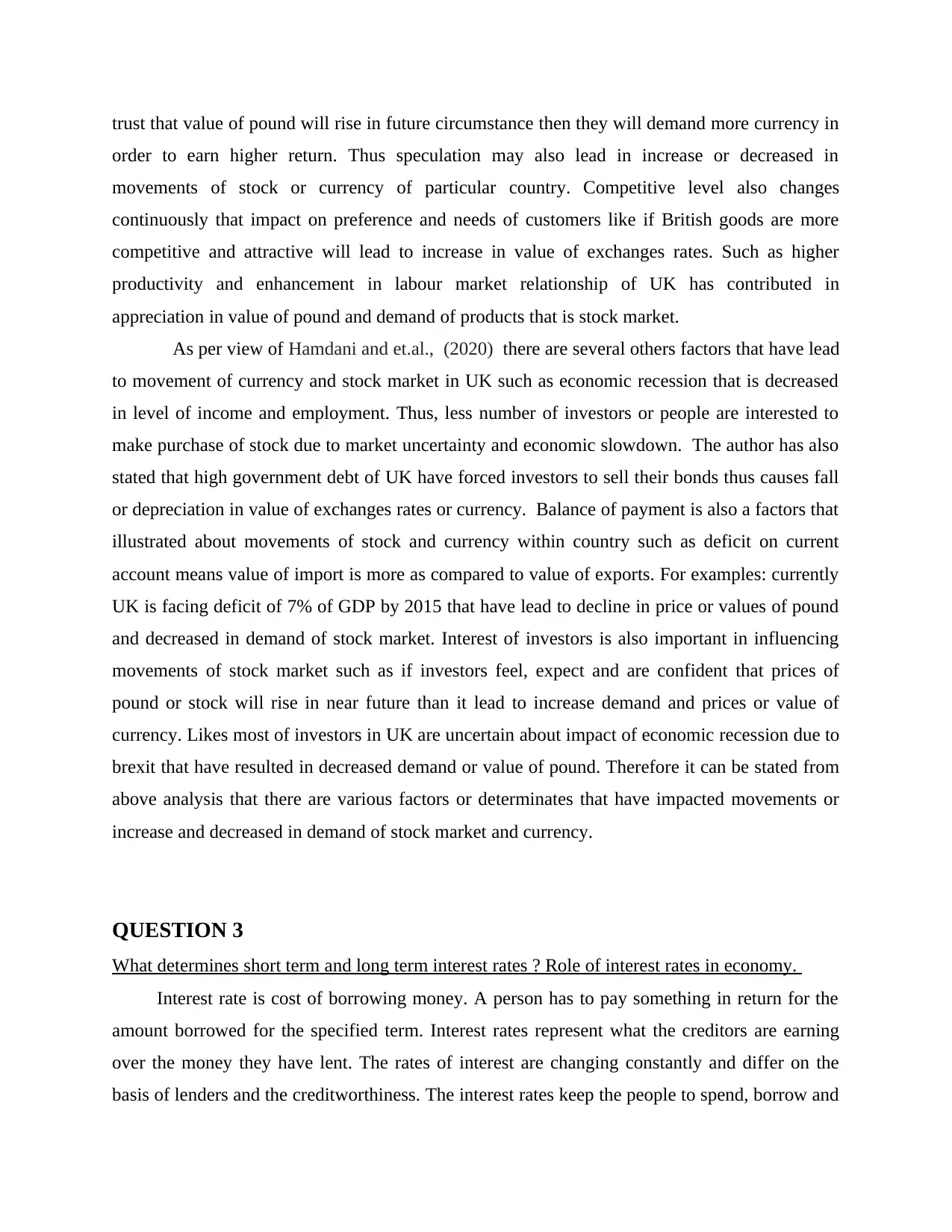
trust that value of pound will rise in future circumstance then they will demand more currency in
order to earn higher return. Thus speculation may also lead in increase or decreased in
movements of stock or currency of particular country. Competitive level also changes
continuously that impact on preference and needs of customers like if British goods are more
competitive and attractive will lead to increase in value of exchanges rates. Such as higher
productivity and enhancement in labour market relationship of UK has contributed in
appreciation in value of pound and demand of products that is stock market.
As per view of Hamdani and et.al., (2020) there are several others factors that have lead
to movement of currency and stock market in UK such as economic recession that is decreased
in level of income and employment. Thus, less number of investors or people are interested to
make purchase of stock due to market uncertainty and economic slowdown. The author has also
stated that high government debt of UK have forced investors to sell their bonds thus causes fall
or depreciation in value of exchanges rates or currency. Balance of payment is also a factors that
illustrated about movements of stock and currency within country such as deficit on current
account means value of import is more as compared to value of exports. For examples: currently
UK is facing deficit of 7% of GDP by 2015 that have lead to decline in price or values of pound
and decreased in demand of stock market. Interest of investors is also important in influencing
movements of stock market such as if investors feel, expect and are confident that prices of
pound or stock will rise in near future than it lead to increase demand and prices or value of
currency. Likes most of investors in UK are uncertain about impact of economic recession due to
brexit that have resulted in decreased demand or value of pound. Therefore it can be stated from
above analysis that there are various factors or determinates that have impacted movements or
increase and decreased in demand of stock market and currency.
QUESTION 3
What determines short term and long term interest rates ? Role of interest rates in economy.
Interest rate is cost of borrowing money. A person has to pay something in return for the
amount borrowed for the specified term. Interest rates represent what the creditors are earning
over the money they have lent. The rates of interest are changing constantly and differ on the
basis of lenders and the creditworthiness. The interest rates keep the people to spend, borrow and
order to earn higher return. Thus speculation may also lead in increase or decreased in
movements of stock or currency of particular country. Competitive level also changes
continuously that impact on preference and needs of customers like if British goods are more
competitive and attractive will lead to increase in value of exchanges rates. Such as higher
productivity and enhancement in labour market relationship of UK has contributed in
appreciation in value of pound and demand of products that is stock market.
As per view of Hamdani and et.al., (2020) there are several others factors that have lead
to movement of currency and stock market in UK such as economic recession that is decreased
in level of income and employment. Thus, less number of investors or people are interested to
make purchase of stock due to market uncertainty and economic slowdown. The author has also
stated that high government debt of UK have forced investors to sell their bonds thus causes fall
or depreciation in value of exchanges rates or currency. Balance of payment is also a factors that
illustrated about movements of stock and currency within country such as deficit on current
account means value of import is more as compared to value of exports. For examples: currently
UK is facing deficit of 7% of GDP by 2015 that have lead to decline in price or values of pound
and decreased in demand of stock market. Interest of investors is also important in influencing
movements of stock market such as if investors feel, expect and are confident that prices of
pound or stock will rise in near future than it lead to increase demand and prices or value of
currency. Likes most of investors in UK are uncertain about impact of economic recession due to
brexit that have resulted in decreased demand or value of pound. Therefore it can be stated from
above analysis that there are various factors or determinates that have impacted movements or
increase and decreased in demand of stock market and currency.
QUESTION 3
What determines short term and long term interest rates ? Role of interest rates in economy.
Interest rate is cost of borrowing money. A person has to pay something in return for the
amount borrowed for the specified term. Interest rates represent what the creditors are earning
over the money they have lent. The rates of interest are changing constantly and differ on the
basis of lenders and the creditworthiness. The interest rates keep the people to spend, borrow and
Paraphrase This Document
Need a fresh take? Get an instant paraphrase of this document with our AI Paraphraser
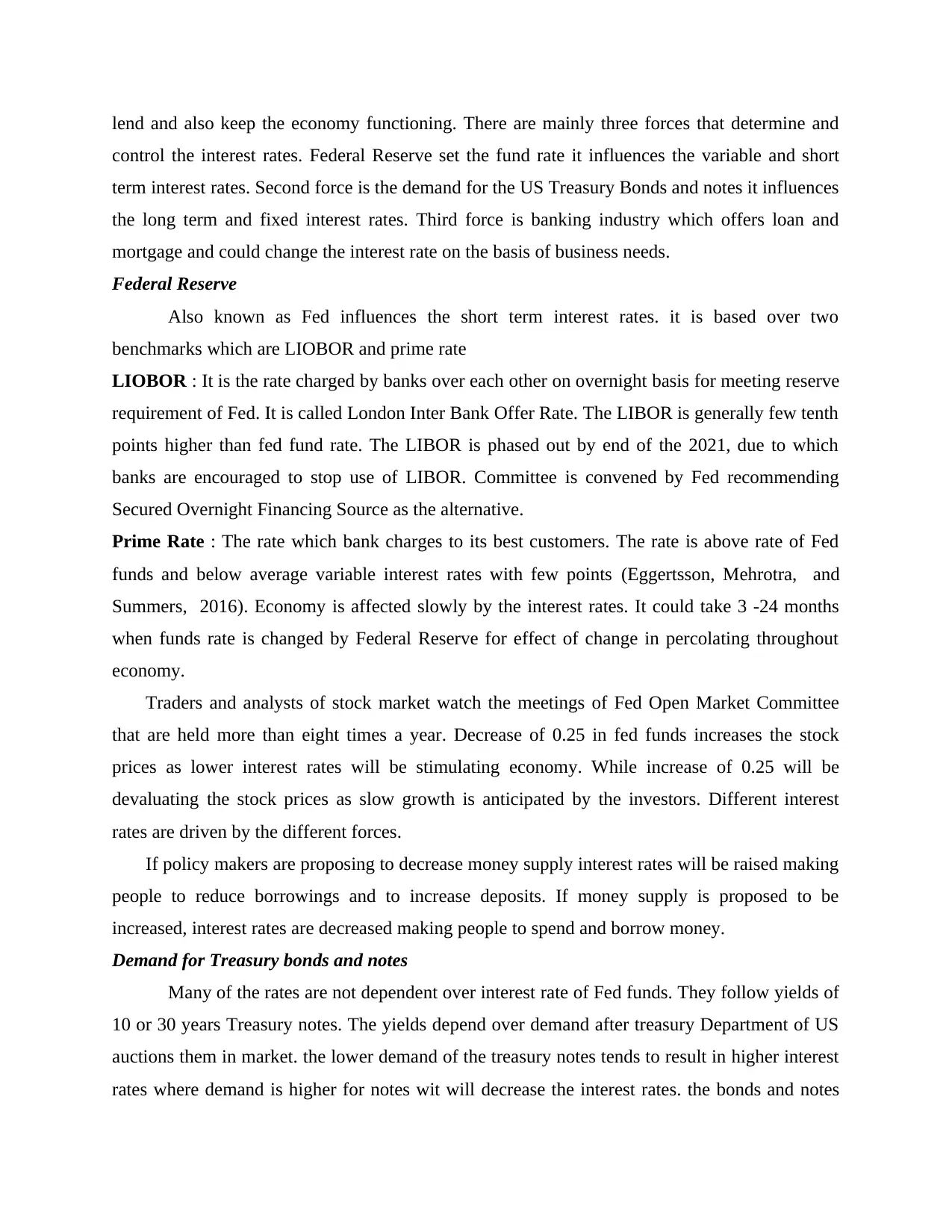
lend and also keep the economy functioning. There are mainly three forces that determine and
control the interest rates. Federal Reserve set the fund rate it influences the variable and short
term interest rates. Second force is the demand for the US Treasury Bonds and notes it influences
the long term and fixed interest rates. Third force is banking industry which offers loan and
mortgage and could change the interest rate on the basis of business needs.
Federal Reserve
Also known as Fed influences the short term interest rates. it is based over two
benchmarks which are LIOBOR and prime rate
LIOBOR : It is the rate charged by banks over each other on overnight basis for meeting reserve
requirement of Fed. It is called London Inter Bank Offer Rate. The LIBOR is generally few tenth
points higher than fed fund rate. The LIBOR is phased out by end of the 2021, due to which
banks are encouraged to stop use of LIBOR. Committee is convened by Fed recommending
Secured Overnight Financing Source as the alternative.
Prime Rate : The rate which bank charges to its best customers. The rate is above rate of Fed
funds and below average variable interest rates with few points (Eggertsson, Mehrotra, and
Summers, 2016). Economy is affected slowly by the interest rates. It could take 3 -24 months
when funds rate is changed by Federal Reserve for effect of change in percolating throughout
economy.
Traders and analysts of stock market watch the meetings of Fed Open Market Committee
that are held more than eight times a year. Decrease of 0.25 in fed funds increases the stock
prices as lower interest rates will be stimulating economy. While increase of 0.25 will be
devaluating the stock prices as slow growth is anticipated by the investors. Different interest
rates are driven by the different forces.
If policy makers are proposing to decrease money supply interest rates will be raised making
people to reduce borrowings and to increase deposits. If money supply is proposed to be
increased, interest rates are decreased making people to spend and borrow money.
Demand for Treasury bonds and notes
Many of the rates are not dependent over interest rate of Fed funds. They follow yields of
10 or 30 years Treasury notes. The yields depend over demand after treasury Department of US
auctions them in market. the lower demand of the treasury notes tends to result in higher interest
rates where demand is higher for notes wit will decrease the interest rates. the bonds and notes
control the interest rates. Federal Reserve set the fund rate it influences the variable and short
term interest rates. Second force is the demand for the US Treasury Bonds and notes it influences
the long term and fixed interest rates. Third force is banking industry which offers loan and
mortgage and could change the interest rate on the basis of business needs.
Federal Reserve
Also known as Fed influences the short term interest rates. it is based over two
benchmarks which are LIOBOR and prime rate
LIOBOR : It is the rate charged by banks over each other on overnight basis for meeting reserve
requirement of Fed. It is called London Inter Bank Offer Rate. The LIBOR is generally few tenth
points higher than fed fund rate. The LIBOR is phased out by end of the 2021, due to which
banks are encouraged to stop use of LIBOR. Committee is convened by Fed recommending
Secured Overnight Financing Source as the alternative.
Prime Rate : The rate which bank charges to its best customers. The rate is above rate of Fed
funds and below average variable interest rates with few points (Eggertsson, Mehrotra, and
Summers, 2016). Economy is affected slowly by the interest rates. It could take 3 -24 months
when funds rate is changed by Federal Reserve for effect of change in percolating throughout
economy.
Traders and analysts of stock market watch the meetings of Fed Open Market Committee
that are held more than eight times a year. Decrease of 0.25 in fed funds increases the stock
prices as lower interest rates will be stimulating economy. While increase of 0.25 will be
devaluating the stock prices as slow growth is anticipated by the investors. Different interest
rates are driven by the different forces.
If policy makers are proposing to decrease money supply interest rates will be raised making
people to reduce borrowings and to increase deposits. If money supply is proposed to be
increased, interest rates are decreased making people to spend and borrow money.
Demand for Treasury bonds and notes
Many of the rates are not dependent over interest rate of Fed funds. They follow yields of
10 or 30 years Treasury notes. The yields depend over demand after treasury Department of US
auctions them in market. the lower demand of the treasury notes tends to result in higher interest
rates where demand is higher for notes wit will decrease the interest rates. the bonds and notes
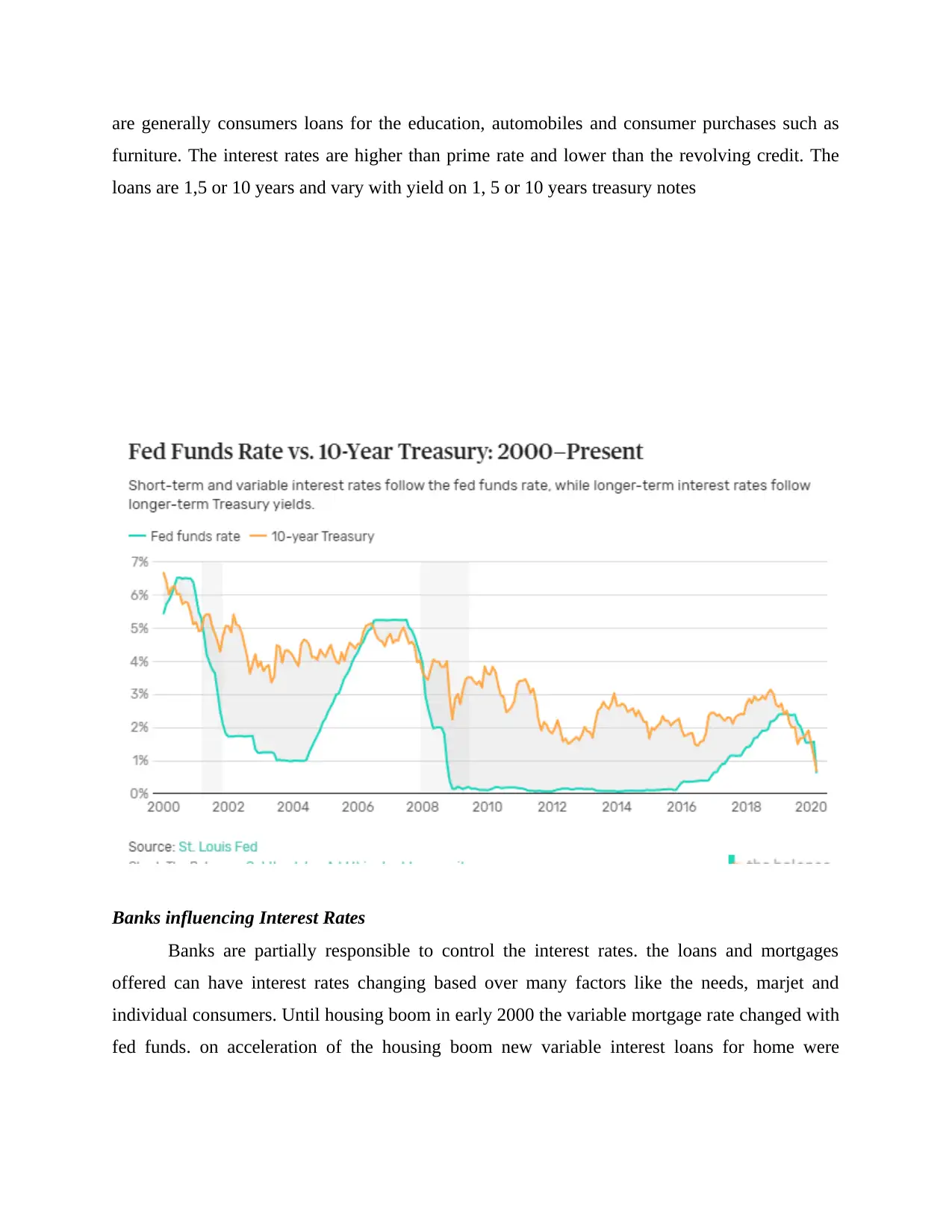
are generally consumers loans for the education, automobiles and consumer purchases such as
furniture. The interest rates are higher than prime rate and lower than the revolving credit. The
loans are 1,5 or 10 years and vary with yield on 1, 5 or 10 years treasury notes
Banks influencing Interest Rates
Banks are partially responsible to control the interest rates. the loans and mortgages
offered can have interest rates changing based over many factors like the needs, marjet and
individual consumers. Until housing boom in early 2000 the variable mortgage rate changed with
fed funds. on acceleration of the housing boom new variable interest loans for home were
furniture. The interest rates are higher than prime rate and lower than the revolving credit. The
loans are 1,5 or 10 years and vary with yield on 1, 5 or 10 years treasury notes
Banks influencing Interest Rates
Banks are partially responsible to control the interest rates. the loans and mortgages
offered can have interest rates changing based over many factors like the needs, marjet and
individual consumers. Until housing boom in early 2000 the variable mortgage rate changed with
fed funds. on acceleration of the housing boom new variable interest loans for home were
⊘ This is a preview!⊘
Do you want full access?
Subscribe today to unlock all pages.

Trusted by 1+ million students worldwide
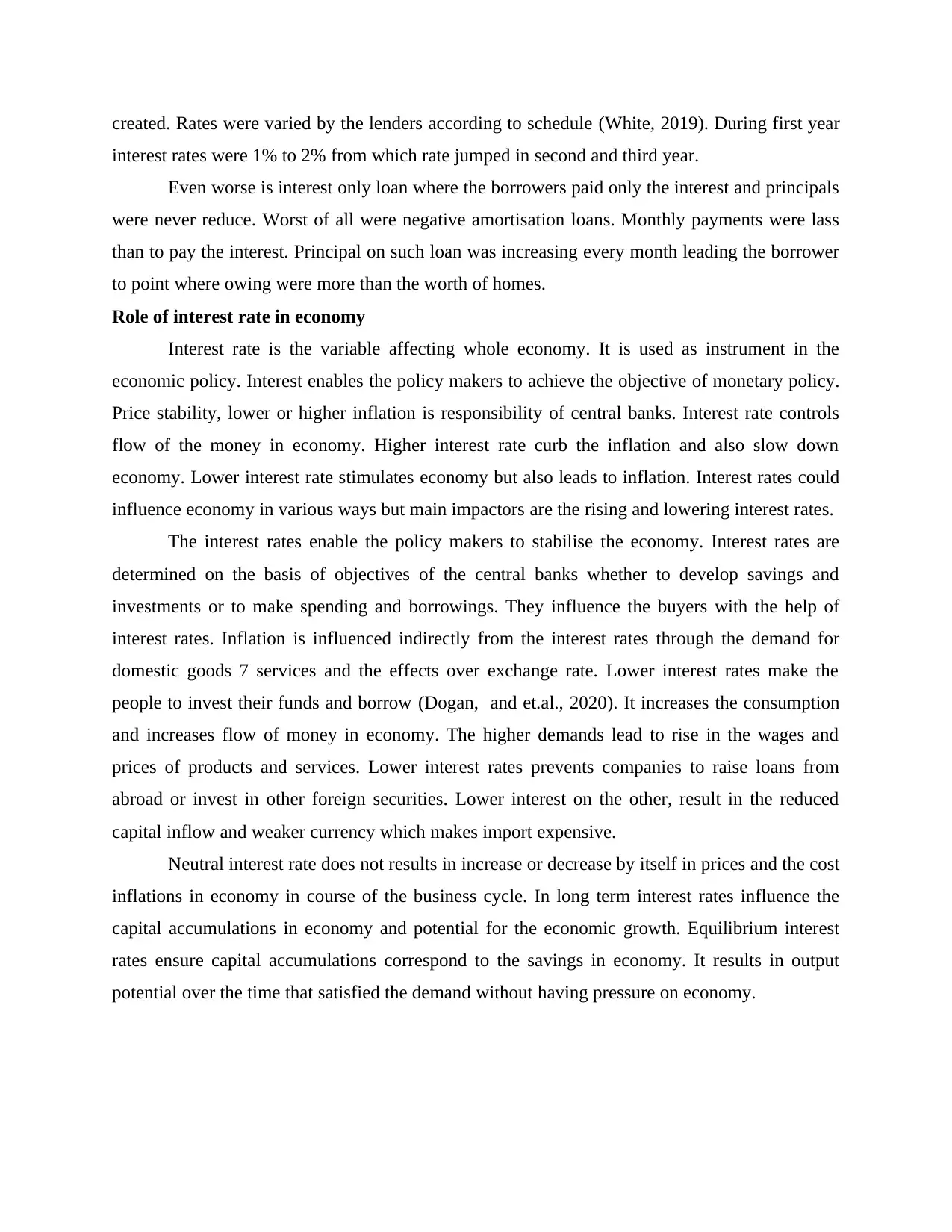
created. Rates were varied by the lenders according to schedule (White, 2019). During first year
interest rates were 1% to 2% from which rate jumped in second and third year.
Even worse is interest only loan where the borrowers paid only the interest and principals
were never reduce. Worst of all were negative amortisation loans. Monthly payments were lass
than to pay the interest. Principal on such loan was increasing every month leading the borrower
to point where owing were more than the worth of homes.
Role of interest rate in economy
Interest rate is the variable affecting whole economy. It is used as instrument in the
economic policy. Interest enables the policy makers to achieve the objective of monetary policy.
Price stability, lower or higher inflation is responsibility of central banks. Interest rate controls
flow of the money in economy. Higher interest rate curb the inflation and also slow down
economy. Lower interest rate stimulates economy but also leads to inflation. Interest rates could
influence economy in various ways but main impactors are the rising and lowering interest rates.
The interest rates enable the policy makers to stabilise the economy. Interest rates are
determined on the basis of objectives of the central banks whether to develop savings and
investments or to make spending and borrowings. They influence the buyers with the help of
interest rates. Inflation is influenced indirectly from the interest rates through the demand for
domestic goods 7 services and the effects over exchange rate. Lower interest rates make the
people to invest their funds and borrow (Dogan, and et.al., 2020). It increases the consumption
and increases flow of money in economy. The higher demands lead to rise in the wages and
prices of products and services. Lower interest rates prevents companies to raise loans from
abroad or invest in other foreign securities. Lower interest on the other, result in the reduced
capital inflow and weaker currency which makes import expensive.
Neutral interest rate does not results in increase or decrease by itself in prices and the cost
inflations in economy in course of the business cycle. In long term interest rates influence the
capital accumulations in economy and potential for the economic growth. Equilibrium interest
rates ensure capital accumulations correspond to the savings in economy. It results in output
potential over the time that satisfied the demand without having pressure on economy.
interest rates were 1% to 2% from which rate jumped in second and third year.
Even worse is interest only loan where the borrowers paid only the interest and principals
were never reduce. Worst of all were negative amortisation loans. Monthly payments were lass
than to pay the interest. Principal on such loan was increasing every month leading the borrower
to point where owing were more than the worth of homes.
Role of interest rate in economy
Interest rate is the variable affecting whole economy. It is used as instrument in the
economic policy. Interest enables the policy makers to achieve the objective of monetary policy.
Price stability, lower or higher inflation is responsibility of central banks. Interest rate controls
flow of the money in economy. Higher interest rate curb the inflation and also slow down
economy. Lower interest rate stimulates economy but also leads to inflation. Interest rates could
influence economy in various ways but main impactors are the rising and lowering interest rates.
The interest rates enable the policy makers to stabilise the economy. Interest rates are
determined on the basis of objectives of the central banks whether to develop savings and
investments or to make spending and borrowings. They influence the buyers with the help of
interest rates. Inflation is influenced indirectly from the interest rates through the demand for
domestic goods 7 services and the effects over exchange rate. Lower interest rates make the
people to invest their funds and borrow (Dogan, and et.al., 2020). It increases the consumption
and increases flow of money in economy. The higher demands lead to rise in the wages and
prices of products and services. Lower interest rates prevents companies to raise loans from
abroad or invest in other foreign securities. Lower interest on the other, result in the reduced
capital inflow and weaker currency which makes import expensive.
Neutral interest rate does not results in increase or decrease by itself in prices and the cost
inflations in economy in course of the business cycle. In long term interest rates influence the
capital accumulations in economy and potential for the economic growth. Equilibrium interest
rates ensure capital accumulations correspond to the savings in economy. It results in output
potential over the time that satisfied the demand without having pressure on economy.
Paraphrase This Document
Need a fresh take? Get an instant paraphrase of this document with our AI Paraphraser
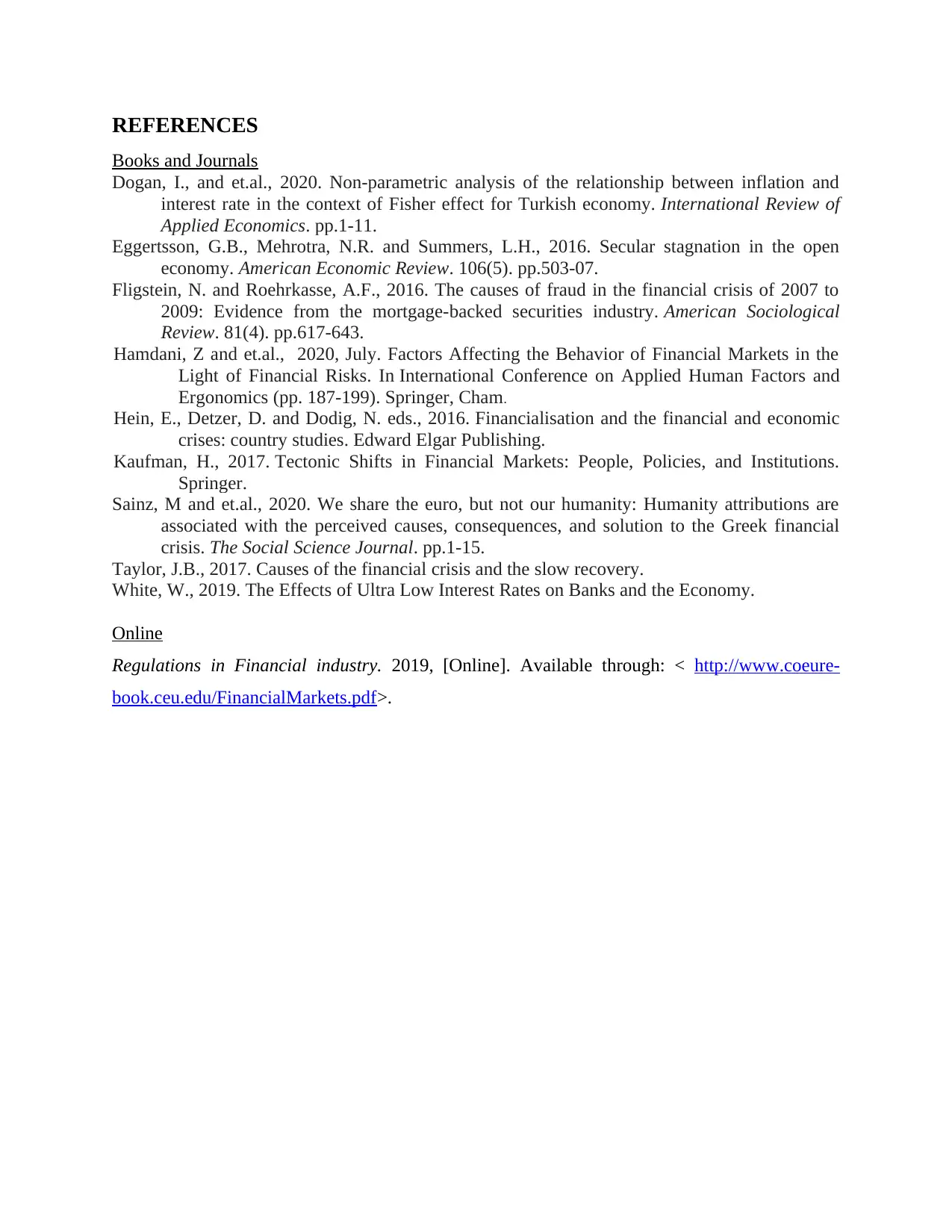
REFERENCES
Books and Journals
Dogan, I., and et.al., 2020. Non-parametric analysis of the relationship between inflation and
interest rate in the context of Fisher effect for Turkish economy. International Review of
Applied Economics. pp.1-11.
Eggertsson, G.B., Mehrotra, N.R. and Summers, L.H., 2016. Secular stagnation in the open
economy. American Economic Review. 106(5). pp.503-07.
Fligstein, N. and Roehrkasse, A.F., 2016. The causes of fraud in the financial crisis of 2007 to
2009: Evidence from the mortgage-backed securities industry. American Sociological
Review. 81(4). pp.617-643.
Hamdani, Z and et.al., 2020, July. Factors Affecting the Behavior of Financial Markets in the
Light of Financial Risks. In International Conference on Applied Human Factors and
Ergonomics (pp. 187-199). Springer, Cham.
Hein, E., Detzer, D. and Dodig, N. eds., 2016. Financialisation and the financial and economic
crises: country studies. Edward Elgar Publishing.
Kaufman, H., 2017. Tectonic Shifts in Financial Markets: People, Policies, and Institutions.
Springer.
Sainz, M and et.al., 2020. We share the euro, but not our humanity: Humanity attributions are
associated with the perceived causes, consequences, and solution to the Greek financial
crisis. The Social Science Journal. pp.1-15.
Taylor, J.B., 2017. Causes of the financial crisis and the slow recovery.
White, W., 2019. The Effects of Ultra Low Interest Rates on Banks and the Economy.
Online
Regulations in Financial industry. 2019, [Online]. Available through: < http://www.coeure-
book.ceu.edu/FinancialMarkets.pdf>.
Books and Journals
Dogan, I., and et.al., 2020. Non-parametric analysis of the relationship between inflation and
interest rate in the context of Fisher effect for Turkish economy. International Review of
Applied Economics. pp.1-11.
Eggertsson, G.B., Mehrotra, N.R. and Summers, L.H., 2016. Secular stagnation in the open
economy. American Economic Review. 106(5). pp.503-07.
Fligstein, N. and Roehrkasse, A.F., 2016. The causes of fraud in the financial crisis of 2007 to
2009: Evidence from the mortgage-backed securities industry. American Sociological
Review. 81(4). pp.617-643.
Hamdani, Z and et.al., 2020, July. Factors Affecting the Behavior of Financial Markets in the
Light of Financial Risks. In International Conference on Applied Human Factors and
Ergonomics (pp. 187-199). Springer, Cham.
Hein, E., Detzer, D. and Dodig, N. eds., 2016. Financialisation and the financial and economic
crises: country studies. Edward Elgar Publishing.
Kaufman, H., 2017. Tectonic Shifts in Financial Markets: People, Policies, and Institutions.
Springer.
Sainz, M and et.al., 2020. We share the euro, but not our humanity: Humanity attributions are
associated with the perceived causes, consequences, and solution to the Greek financial
crisis. The Social Science Journal. pp.1-15.
Taylor, J.B., 2017. Causes of the financial crisis and the slow recovery.
White, W., 2019. The Effects of Ultra Low Interest Rates on Banks and the Economy.
Online
Regulations in Financial industry. 2019, [Online]. Available through: < http://www.coeure-
book.ceu.edu/FinancialMarkets.pdf>.
1 out of 11
Related Documents
Your All-in-One AI-Powered Toolkit for Academic Success.
+13062052269
info@desklib.com
Available 24*7 on WhatsApp / Email
![[object Object]](/_next/static/media/star-bottom.7253800d.svg)
Unlock your academic potential
Copyright © 2020–2026 A2Z Services. All Rights Reserved. Developed and managed by ZUCOL.





